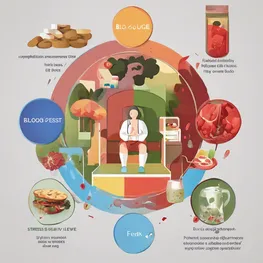Table of contents
- The Connection Between Sleep and Blood Sugar Regulation
- Effective Strategies for Better Sleep Hygiene
- Exploring the Link Between Sleep and Our Food Preferences
- The Link Between Sleep Hygiene and Blood Sugar Control: Tips for Success
- Unlock Restful Sleep and Balance Blood Sugar Levels with Nourishing Diets
Sleep hygiene and blood sugar levels may seem like unrelated topics, but recent research has uncovered a surprising connection between the two. Poor sleep quality and duration can have a significant impact on our body's ability to regulate blood sugar, which can lead to a host of health problems, including diabetes. In this article, we will explore the relationship between sleep hygiene and blood sugar and discuss ways to improve both for better overall health.
The Connection Between Sleep and Blood Sugar Regulation
Sleep deprivation can have a profound impact on the regulation of blood sugar levels, leading to potential health risks. Understanding this connection is crucial for maintaining overall well-being.
-
Increased insulin resistance
Lack of sleep can significantly increase insulin resistance, making it harder for the body to process and use insulin effectively. This can lead to higher blood sugar levels and an increased risk of developing type 2 diabetes.
-
Impaired glucose tolerance
Sleep deprivation also affects the body's ability to tolerate glucose. When sleep is compromised, the body becomes less efficient in clearing glucose from the bloodstream, resulting in elevated blood sugar levels. This can contribute to the development of diabetes and other metabolic disorders.
-
Altered appetite regulation
Insufficient sleep disrupts the balance of hormones involved in appetite regulation. It increases the production of ghrelin, a hormone that stimulates hunger and decreases the production of leptin, a hormone that signals satiety. As a result, sleep-deprived individuals may experience increased cravings for high-calorie and sugary foods, further impacting blood sugar control.
-
Heightened stress response
Sleep deprivation triggers a heightened stress response in the body, leading to an increase in the production of stress hormones like cortisol. Elevated cortisol levels can raise blood sugar levels by promoting the release of glucose from the liver, contributing to a dysregulated blood sugar balance.
-
Impaired cognitive function
Lack of sleep can impair cognitive function, including decision-making and impulse control. This can lead to poor dietary choices and difficulty in adhering to a balanced and healthy diet, further exacerbating blood sugar fluctuations.
Effective Strategies for Better Sleep Hygiene
Establishing a regular sleep schedule is crucial for maintaining optimal sleep hygiene. Consistency in sleep patterns not only helps you fall asleep faster but also ensures a more restful and rejuvenating sleep. By following a regular sleep schedule, you can improve your overall sleep quality and wake up feeling refreshed every day.
- Set a fixed bedtime and wake-up time: Going to bed and waking up at the same time every day, even on weekends, helps regulate your body's internal clock. It trains your brain to recognize when it's time to sleep and wake up.
- Create a relaxing bedtime routine: Engaging in calming activities before bed, such as reading a book or taking a warm bath, signals your body that it's time to wind down. Avoid stimulating activities like intense exercise or screen time before sleep.
- Limit exposure to electronics: The blue light emitted by electronic devices can interfere with melatonin production, making it difficult to fall asleep. Minimize screen time at least an hour before bed.
- Make your sleep environment conducive to sleep: Ensure your bedroom is cool, dark, and quiet. Use blackout curtains, earplugs, or white noise machines to create a sleep-friendly environment.
- Avoid caffeine and heavy meals: Stimulants like caffeine and heavy meals close to bedtime can disrupt sleep. Avoid consuming them at least a few hours before sleep.
- Manage stress levels: Stress and anxiety can make it harder to fall asleep. Practice stress management techniques, such as deep breathing exercises or meditation, to relax your mind before bed.
Exploring the Link Between Sleep and Our Food Preferences
Lack of sleep disrupts the balance of hormones that regulate appetite, leading to increased cravings for high-calorie and unhealthy foods. Additionally, sleep deprivation impairs the prefrontal cortex, which is responsible for making rational food choices, resulting in a higher likelihood of consuming unhealthy foods.
The Link Between Sleep Hygiene and Blood Sugar Control: Tips for Success
Maintaining a healthy sleep routine is crucial for effective blood sugar control. One essential aspect of sleep hygiene is limiting caffeine and alcohol intake. Here are a few reasons why limiting these substances can positively impact your blood sugar levels:
- Caffeine can interfere with the quality of your sleep. Consuming caffeinated beverages close to bedtime can make it harder for you to fall asleep or stay asleep throughout the night. This can disrupt your sleep pattern, leading to reduced insulin sensitivity and impaired blood sugar regulation.
- Alcohol can disrupt your sleep cycle. While it may make you feel drowsy initially, it can later interfere with achieving deep and restful sleep. Disrupted sleep can impact your body's ability to regulate blood sugar effectively.
- Caffeine and alcohol can both lead to dehydration. Insufficient hydration can affect blood sugar control as it can lead to increased blood sugar levels. It is important to consume adequate amounts of water throughout the day to stay hydrated.
- Both caffeine and alcohol can cause fluctuations in blood sugar levels. Caffeine may temporarily raise blood sugar levels, while alcohol can initially lower blood sugar but lead to a rebound effect later.
- Limiting caffeine and alcohol intake can improve overall sleep quality, promote proper blood sugar regulation, and contribute to a more balanced and healthy lifestyle.
Unlock Restful Sleep and Balance Blood Sugar Levels with Nourishing Diets
Maintaining stable blood sugar levels is crucial for overall health and well-being. One of the key factors in achieving this balance is consuming balanced meals. A balanced meal consists of a combination of carbohydrates, proteins, and fats in appropriate proportions. Here's why balanced meals play a vital role in stabilizing blood sugar levels:
-
Carbohydrates for energy
Carbohydrates, such as whole grains, fruits, and vegetables, are an important source of energy. When consumed in moderation, they provide a steady release of glucose into the bloodstream, preventing spikes and crashes in blood sugar levels.
-
Protein for satiety
Including protein-rich foods, like lean meats, poultry, fish, legumes, and dairy products, in your meals helps promote satiety. Proteins are digested slowly, ensuring a gradual release of glucose into the bloodstream and preventing sudden fluctuations in blood sugar levels.
-
Healthy fats for balance
Adding healthy fats, such as avocados, nuts, seeds, and olive oil, to your meals can help stabilize blood sugar levels. Fats slow down digestion and the absorption of nutrients, preventing rapid spikes in blood sugar.
-
Fiber for regulation
Consuming fiber-rich foods, like whole grains, fruits, vegetables, and legumes, aids in regulating blood sugar levels. Fiber slows down the absorption of glucose, preventing sharp increases in blood sugar and promoting overall blood sugar control.
-
Meal timing and portion control
Eating balanced meals at regular intervals, and practicing portion control, can also help stabilize blood sugar levels. Spreading out your meals and snacks evenly throughout the day helps prevent blood sugar spikes and promotes a steady supply of energy.
In conclusion, it is evident that there is a natural connection between sleep hygiene and blood sugar regulation. Poor sleep quality and duration have been linked to insulin resistance, increased appetite, and higher blood sugar levels. On the other hand, adopting good sleep habits, such as maintaining a regular sleep schedule, avoiding caffeine before bed, and creating a relaxing sleep environment, can promote better blood sugar control. Incorporating sleep hygiene practices into one's daily routine may not only improve overall sleep quality but also contribute to better management of blood sugar levels.
Frequently asked questions related to sleep hygiene and blood sugar connection
How does sleep affect blood sugar levels?
Lack of sleep can lead to increased blood sugar levels and insulin resistance. It can also disrupt the hormonal balance that regulates glucose metabolism.
What is the recommended amount of sleep for maintaining healthy blood sugar levels?
Most adults need between 7-9 hours of quality sleep per night to maintain healthy blood sugar levels.
Can exercise help improve sleep and blood sugar control?
Yes, regular exercise can help improve both sleep quality and blood sugar control. It can help regulate hormones, reduce stress levels, and promote overall health.
What are some common sleep disorders that can affect blood sugar levels?
Some common sleep disorders that can affect blood sugar levels include sleep apnea, insomnia, and restless leg syndrome.
Can sleep medications affect blood sugar levels?
Yes, certain sleep medications can potentially affect blood sugar levels. It is important to consult with a healthcare professional to determine the best course of action if you are taking sleep medications and have concerns about blood sugar control.
How long does it take for improved sleep habits to impact blood sugar levels?
The time it takes for improved sleep habits to impact blood sugar levels can vary depending on individual factors. However, consistently practicing good sleep hygiene habits over time can lead to better blood sugar control.
Can stress and anxiety affect both sleep and blood sugar levels?
Yes, stress and anxiety can affect both sleep quality and blood sugar levels. Chronic stress can lead to hormonal imbalances that can disrupt sleep and interfere with glucose metabolism.
How can I improve my sleep hygiene?
Some tips for improving sleep hygiene include establishing a regular sleep schedule, creating a relaxing bedtime routine, avoiding stimulants like caffeine before bed, and creating a comfortable sleep environment.
Are there any natural remedies for better sleep?
Some natural remedies for better sleep include practicing relaxation techniques such as meditation or deep breathing exercises, using aromatherapy with calming scents like lavender, and incorporating herbal supplements like valerian root or chamomile tea.
Does poor sleep increase the risk of developing type 2 diabetes?
Yes, research suggests that poor sleep can increase the risk of developing type 2 diabetes due to its impact on blood sugar regulation and insulin sensitivity.







